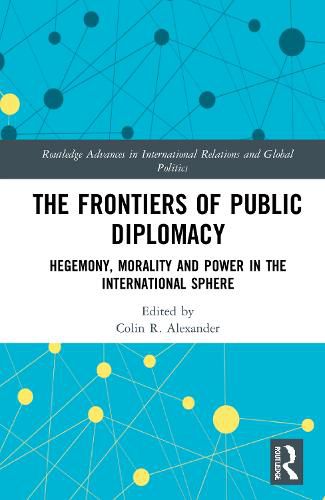Readings Newsletter
Become a Readings Member to make your shopping experience even easier.
Sign in or sign up for free!
You’re not far away from qualifying for FREE standard shipping within Australia
You’ve qualified for FREE standard shipping within Australia
The cart is loading…






This edited volume provides one of the most formidable critical inquiries into public diplomacy’s relationship with hegemony, morality and power. Wherein, the examination of public diplomacy’s ‘frontiers’ will aid scholars and students alike in their acquiring of greater critical understanding around the values and intentions that are at the crux of this area of statecraft.
For the contributing authors to this edited volume, public diplomacy is not just a political communications term, it is also a moral term within which actors attempt to convey a sense of their own virtuosity and ‘goodness’ to international audiences. The book thereby provides fascinating insight into public diplomacy from the under-researched angle of moral philosophy and ethics, arguing that public diplomacy is one of the primary vehicles through which international actors engage in moral rhetoric to meet their power goals.
The Frontiers of Public Diplomacy is a landmark book for scholars, students and practitioners of the subject. At a practical level, it provides a series of interesting case studies of public diplomacy in peripheral settings. However, at a conceptual level, it challenges the reader to consider more fully the assumptions that they may make about public diplomacy and its role within the international system.
$9.00 standard shipping within Australia
FREE standard shipping within Australia for orders over $100.00
Express & International shipping calculated at checkout
This edited volume provides one of the most formidable critical inquiries into public diplomacy’s relationship with hegemony, morality and power. Wherein, the examination of public diplomacy’s ‘frontiers’ will aid scholars and students alike in their acquiring of greater critical understanding around the values and intentions that are at the crux of this area of statecraft.
For the contributing authors to this edited volume, public diplomacy is not just a political communications term, it is also a moral term within which actors attempt to convey a sense of their own virtuosity and ‘goodness’ to international audiences. The book thereby provides fascinating insight into public diplomacy from the under-researched angle of moral philosophy and ethics, arguing that public diplomacy is one of the primary vehicles through which international actors engage in moral rhetoric to meet their power goals.
The Frontiers of Public Diplomacy is a landmark book for scholars, students and practitioners of the subject. At a practical level, it provides a series of interesting case studies of public diplomacy in peripheral settings. However, at a conceptual level, it challenges the reader to consider more fully the assumptions that they may make about public diplomacy and its role within the international system.